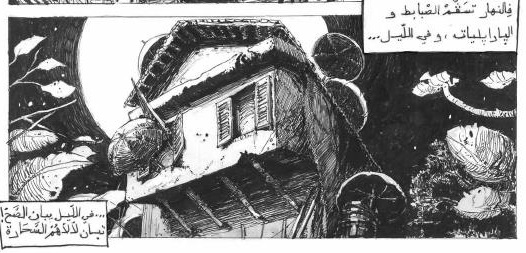كُميكس فاطمة انپاراپلي بقلم صافية ورزكي, رسوم محمود بن عمر و سامية ورزكي
(Dalimen editions 2014)
written in Algerian Derja by Safia Ouarezki,
ink by Samia Ouarezki and drawings by Mahmoud Benameur
(published by Editions Dalimen in 2014)
In Algiers' Casbah, children are playing and telling each other spooky stories inspired by neighbourhood gossip.
"Fatma of the many umbrellas" and "Lalahoum" are two local women who live on their own. Lalahoum gets by, repairing shoes and administering natural and 'supernatural' remedies to women who are in need of comforting and support. Fatma collects broken umbrellas she finds thrown around and repairs them.
These two women, while very much part of the social-scape of their neighbourhood, nonetheless stand out. They both charm and frighten those around them, their singularity allows them a certain freedom of action, one otherwise not authorised to others... or does it?
Fatma n'paraplui is entirely drawn and inked in black which suits the mood of a story told to spook and disturb. In each plate, the perspective changes and alternates. The reader can become a child looking up to grown ups and seeing them enormous, or part of a group of women looking down the street from balconies watching what they perceive as tiny cramped rooftops. Faces are enlarged and facial traits accentuated as if lighted by a lamp at night during halloween.
Fatma n'paraplui makes for an enchanting read. It is written in Derja and thus opens the language-door to natural conversation, Derja-wisdom, and to the kind of wisecracks people exchange daily.
It is also a wonderful read on account of the story telling devices it uses... which announce a second volume.
Dalimen editions have their own bookshop in Algiers (Cherraga). If you're around, go and visit them!









Comments